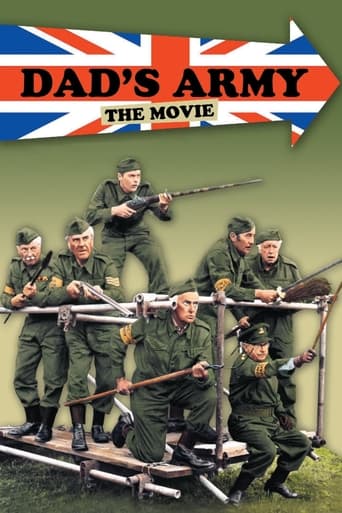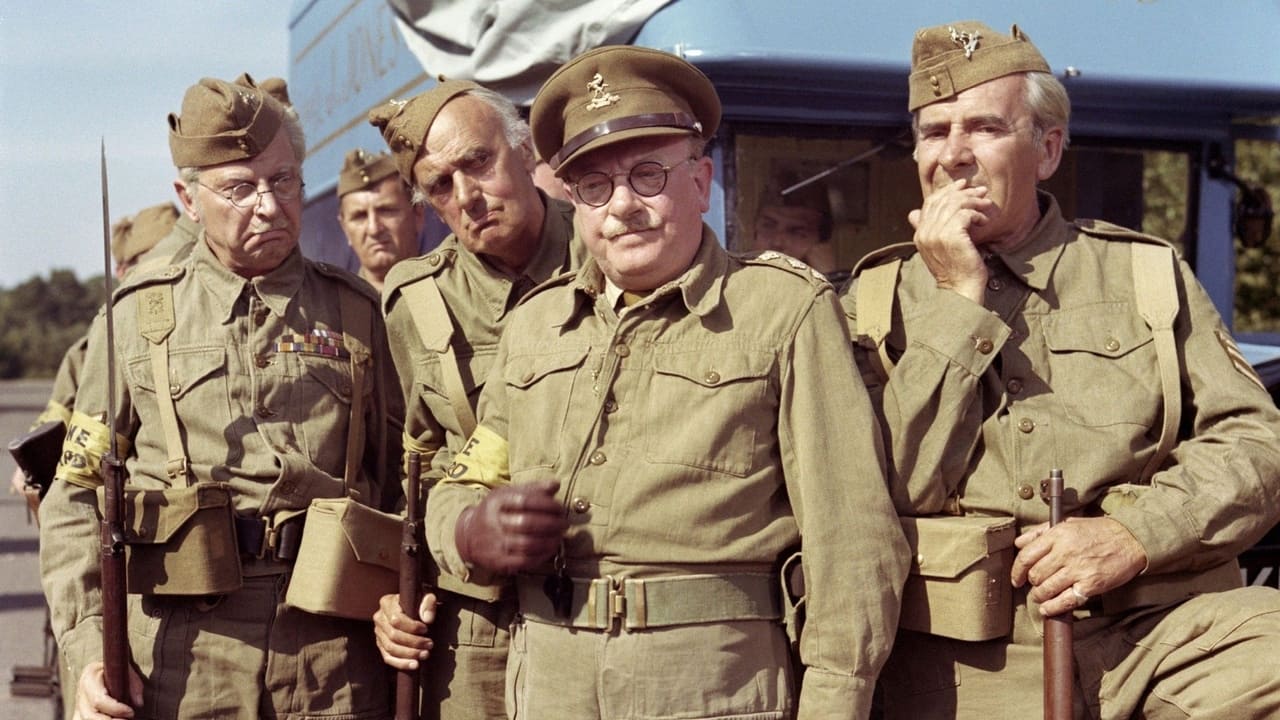Julian Thornton
In my opinion dads army is thee best British sitcom of all time. I believe that if you just watch one episode of the show you cannot judge in completely on that one episode, (this include the movie) You must at least watch a series of this show, get inside the characters, become familiar with there surroundings and the situations which they are in. When you become familiar with the show then it will start appealing to you. Now the movie has a few changes to the series which is slightly disappointing, but it still works. Watch a series or two of the show first before you watch this. You'll not be disappointed. Good episode to watch is "No Spring for Frazer"
sandra small
The film adaptation of Dad's Army exemplifies war as almost a joyous farce, and thus far removed from reality.It is in this film that Dad's Army illustrates how the Home Guard was a propaganda manoeuvre brought about as a means to induce a sense of patriotism among the British people. Therefore all Dad's Army had to defend the country was indeed propaganda, and little else.The propaganda induced patriotism has subsequently been undermined by the Hollywood hijacking of this piece of Britain, which ironically the Nazi's did not succeed in doing.I like the fact that Auther Low's character points out that it was in fact the Nazi's Britain fought against, thereby indicating that the German people were as much victims as us Brits in World War Two.As for the comedy aspect of the film, it is improved upon for Columbia pictures. Left to the BBC it would look more amateurish.Overall, an interesting look at how patriotism via propaganda roused the British spirit during WW2 for the purpose of defence. But what was being defended, and for what purposes, and for whom? These are what begs the questions.
Tom May
"Dad's Army" gets off reasonably lightly here, in view of the old problem British cinema had in adapting popular sitcoms to film in the 1970s. There is a coarsening of the humour, but the historical setting perhaps provides a disincentive to the low-rent ribaldry so beloved of, say, the era's Carry Ons, Confessions..., Frankie Howerd or even Steptoe and Son films.And, contrastingly with Brambell and Corbett, Lowe and Le Mesurier and the rest are restrained, more or less fully in tune with their television portrayals. It is only the often simplified nature of the scriptwriting which impoverishes the characters; they are otherwise present and correct. I feel it was a good decision to re-use the plot of "The Man and the Hour", the series' opening episode, which proves an excellent way to establish the setting, scenario and characters - was this possibly done to help with overseas sales? (I would hazard a bet that it was most successful in Britain overall, which would say a lot...) Such scenes as that of Mainwaring's condescending attitude to the chap in the wireless shop (as they listen to Eden's speech...), and the initial 'interviews' with Jones, Walker etc. stand up as effectively as they did on TV, and are beautifully played.Unfortunately, a glaring error is to actually show the Germans, and mainly as purpose just to point up the plucky 'ingenuity' and 'improvisation' - themes constantly emphasises in the film - of the British Home Guard in comparison with the ruthlessly-planned German army. A contemporary reviewer rightfully mentioned that this robbed the film of the TV series' air of gentle, almost otherworldly fantasy: the Germans are always imagined, and are thus far more serious... and the TV series' focus was on the platoon's world: equally absurd and deadly serious. They are in exactly the same shoes as the older audience, present in the Home Front during WW2, who would never have *seen* actual Germans. The film takes a more 'epic' approach, which makes for a strongly nationalistic tone: most marked in John Burke's novelisation of the film, with its solemn 'and we won' ending.The essential quality of Englishness is beautifully reflected in Godfrey's reading Edward Lear beneath a tree in the pouring rain, and in the use of location filming in the timeless, gorgeous English countryside. Unfortunately, this is double-edged; like the TV series, the 'training manoeuvres' seem just an excuse to get some nice exterior filming. Admittedly, the humour of these scenes might appeal to some, and some of the stalwart actors manage to raise laughs in me, but overall, the long section in the middle of the film is just padding between the cogent bits. The ending in the church is terribly low-key, but fittingly in the sense of the 'stiff upper lip' heroism the film is celebrating - heroism always with a touch of the amateurish and absurd. I don't particularly like the ears-to-the-ground final scene, mind; they should have ended with the blissfully English 'going about business' routine of the platoon in civilian life: Mainwaring passing them on the street.How can I quite summarise my feelings? While much of what I dislike is distilled in the unfortunate 'comedic' musical score, which particularly punctuates the 'training exercise' scenes, the score also contains a lyrical passage when Mainwaring and Wilson speak in silhouette against a wistful sunset:Wilson. It's a beautiful sunset, sir. MAINWARING. It's a beautiful land, Wilson...This film maintains the level of acting seen in the original series, and it makes an admirable attempt to be consciously cinematic. Yes, the focus on Englishness is fairly simplistic, and the scripting notably less subtle, but at least the key elements are in harmony: characters, landscape and theme. It is overall a good encapsulation of the bumbling tenacity and inherent madness of the British; the ridiculous 'messing around' in a sublime countryside, and somehow pulling through to save the 'beautiful land' and its values, against the Nazi threat.
walmington
TV shows from the 1970's which were turned into films were usually terrible. Dad's Army is the big exception. The formula from the TV show worked just as well on the big screen and with the bigger budget it's lovely to see people walking around Walmington-on-Sea. The plot is similar to parts of some of the TV episodes, but that doesn't matter because they're still as funny. Other parts like when Mainwaring, Wilson and Frazer are stranded on the raft are classic. The only thing I can criticise it for is the sometimes obvious lack of input from the TV shows creators and writers, Jimmy Perry and David Croft. But beautiful performances from Arthur Lowe, John Le Mesurier, Clive Dunn etc.



 AD
AD




